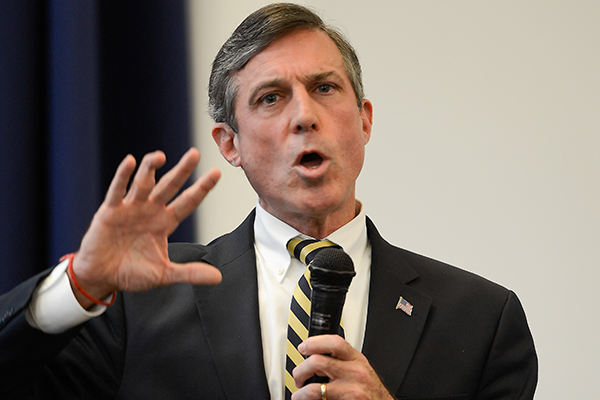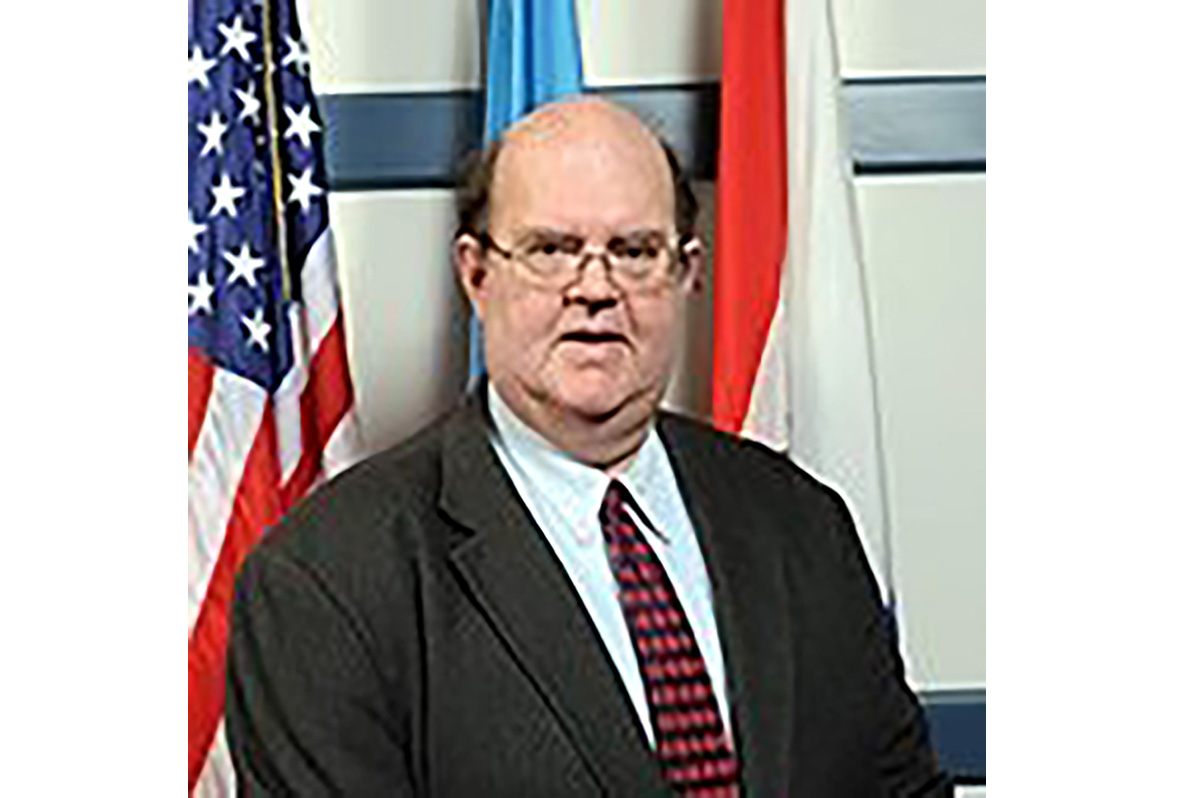Delaware
Delaware governor vetoes legalization of marijuana possession
Carney cites impact on youth, public health, law enforcement

Delaware Gov. John Carney on Tuesday vetoed a bill that would have legalized the possession of marijuana in the First State. House Bill 371, which passed the House on May 5 and the Senate May 12, would legalize the possession of up to one ounce of marijuana and remove criminal and civil penalties associated with the non-remunerative transfer of marijuana for individuals ages 21 or older.
“I do not believe that promoting or expanding the use of recreational marijuana is in the best interests of the state of Delaware, especially our young people,” Carney said in his veto statement Tuesday. “Questions about the long-term health and economic impacts of recreational marijuana use, as well as serious law enforcement concerns, remain unresolved.”
Current state laws deem the possession of one ounce of marijuana or less a civil offense resulting in a financial penalty. Still, the possession of more than one ounce of marijuana remains a misdemeanor — a designation that would remain unchanged with the passage of the bill.
In the statement, Carney acknowledged that marijuana can help individuals with certain health conditions, and said that possession and private consumption of the substance should not lead to imprisonment. But he also noted that these beliefs are already reflected in state legislation, following his passage of marijuana decriminalization in 2019.
“I have been clear about my position since before I took office, and I have articulated my concerns many times,” he added.
The Delaware Center for Justice called upon the General Assembly to override the veto in a Tuesday press release, emphasizing that legalizing marijuana is of particular importance to low-income communities and communities of color across the state.
These communities “experience police harassment and arrest for marijuana at disproportionate rates than those of white affluent communities, despite usage rates being almost the same,” DCJ Director of Policy Kailyn Richards noted in the press release. She added that DCJ believes state legislators should further “pass a companion bill that sets up a safe and legal marketplace.”
The American Civil Liberties Union of Delaware also emphasized that the General Assembly should override the veto.
Carney’s veto of the bill “is an affront to the lawmakers, advocates, and residents of Delaware who have shown consistent and overwhelming support for this measure,” Mike Bichner, ACLU of Delaware executive director, said in a statement Tuesday. “The criminalization of cannabis has been a tool of the failed, racist War on Drugs, which has caused irrevocable harm to our Black communities.”
Delaware
Delaware’s first openly gay elected official dies at 66
John Brady remembered as dedicated public servant

John Brady, the first openly gay elected official in Delaware, passed away in his home on Aug. 10 at age 66 after battling a long illness.
Brady was a deputy attorney general and was elected to three Sussex County offices: register in chancery, recorder of deeds, and clerk of the peace.
While clerk of the peace, Brady performed the first legal same-sex marriages in the state starting in July 2013. He told a local radio station just last week that he performed more than 400 marriages in his four-year term.
“John married my husband and me on the beach in Rehoboth 11 years ago,” said Washington Blade editor Kevin Naff. “He took great time and care in crafting our nuptials. It was a beautiful moment we will never forget. John was a pioneer for the LGBTQ community in Delaware, a dedicated public servant, and a gentleman. He will be missed.”
The day before he passed away on Aug. 9, former Speaker of the House Pete Schwartzkopf and former Lt. Gov. Bethany Hall-Long presented Brady with Delaware’s highest civilian honor for individuals who meet a high standard for community service, the Order of the First State.
Brady retired in 2024 after 32 years as a member of the Delaware Bar and 16 as a state employee. He was also active in the Eagle Scouts, working as a Scout leader and professional scouter. He received the Founder’s Award in 2023, one of the highest honors.
“Delaware mourns the passing of John Brady, a true public servant, trailblazer, and dear friend to many,” Gov. Matt Meyer wrote in a statement on Aug 11. “From his dedication to justice and service through the law to the barriers he broke as Delaware’s first openly gay elected official, John fought with compassion to improve our state and touched countless lives in the process. Lauren’s and my prayers are with John’s family and friends, as we all mourn his passing and celebrate his extraordinary life.”
Delaware
Del. att’y gen’l among plaintiffs suing Trump over access to care for trans youth
Coalition of states filed motion last week

A coalition of more than a dozen states, including Delaware, filed a lawsuit on Aug. 1 to block the Trump administration’s efforts to restrict access to medically necessary care for transgender youth.
Filed in federal court in Massachusetts, the lawsuit challenges Executive Order 14187 from January, in which President Donald Trump refers to gender-affirming care such as puberty blockers, hormone therapy, and surgeries as “mutilation.” It declares that the policy of the United States will be to “not fund, sponsor, promote, assist, or support the so-called ‘transition’ of a child from one sex to another, and it will rigorously enforce all laws that prohibit or limit these destructive and life-altering procedures.”
The suit argues that the EO violates the Administrative Procedure Act (APA) and the Tenth Amendment by asserting federal overreach into state-regulated medical and healthcare decisions.
“It becomes clearer every day that there simply is no bottom to this administration’s cruelty,” said Attorney General Kathy Jennings in a press release. “With his agenda failing and his popularity plummeting, the president is turning to time-tested tactics of demagogues: turning vulnerable people into scapegoats, obsessing over their private lives, and intruding on medical decisions. These stunts make kids into political props and do nothing to help Americans. They are despicable, dangerous, and illegal.”
Gov. Matt Meyer recently signed an executive order making Delaware a shield state for providers of gender-affirming care. It prohibits state agencies from cooperating with investigations, subpoenas, or legal actions by other states against individuals or providers involved in care that is legal in Delaware.
According to the press release, providers in some states have begun to reduce or eliminate services due to federal actions. Nemours Children’s Hospital in Delaware is no longer providing gender-affirming care to new patients.
Medical experts and nearly every major national medical association endorses and supports the availability of gender-affirming care for transgender young people.
“Empirical evidence has demonstrated that trans and nonbinary gender identities are normal variations of human identity and expression,” the American Medical Association said in 2021.
Plaintiffs include the attorneys general of California, Connecticut, D.C., Hawaii, Illinois, Maine, Massachusetts, Maryland, Michigan, Nevada, New Jersey, New Mexico, New York, Rhode Island, and Wisconsin, and the governor of Pennsylvania.
Delaware
Intersex actor, advocate River Gallo attending screening event in Delaware
Afternoon includes screening of ‘Every Body’ and Q&A

Intersex actor and advocate River Gallo will attend a screening of their film “Every Body,” followed by a Q&A in Wilmington, Del. this Saturday.
River Gallo is a Salvadoran-American filmmaker, actor, writer, model, and intersex rights activist from New Jersey. They wrote, directed and starred in the 2024 film “Ponyboi,” the first film to feature an openly intersex actor playing an intersex person. Intersex refers to individuals who are born with reproductive or sexual anatomy that doesn’t fit the typical definitions of male or female.
The movie that will be shown at Theatre N in Wilmington on July 26 at 4 p.m., “Every Body,” documents the lives of three intersex people, including Gallo. Following the film, Gallo will engage in a Q&A to discuss their life as the child of immigrant parents, activism, and film career. The event is hosted by Orgullo Delaware and the Delaware Sexuality and Gender Collective. ACLU Delaware and InterAct are partners in the event.
Noah Duckett co-founded Orgullo Delaware in 2019 with his mom, Julissa Coriano, to provide resources for Latino LGBTQ Delawareans and their families.
Duckett said that a lot of times, intersex people are left out of conversations surrounding the LGBTQ community. He hopes to pack the house for this event and emphasize how special it is that Gallo will be there in-person to connect with the audience about their work.
“I’m really hoping that people will be able to gain more of an understanding of what it must be like to navigate the world as an intersex person,” he said.
Mike Brickner, executive director of the ACLU of Delaware, seconded that the intersex community typically does not get as much spotlight within the LGBTQ umbrella.
“I hope that there are members of the intersex community that do come, that they also feel seen and acknowledged,” he said. “There’s often so few spaces for people to talk about that community and to really share about their experiences, so I do hope that visibility brings some level of comfort to folks.”
InterAct is an organization dedicated to the rights of intersex youth. It was initially founded with the goal of bringing legal action against the practice of non-consensual surgeries on intersex infants, according to Maddie Moran, the director of communications.
Moran said intersex people have historically been victimized and targeted by the government, by medical institutions, and by legal institutions. They said the average politician can’t even define intersex.
“Many of the average people in society don’t know that intersex people exist, and don’t understand that sex is not as strict as an XX and XY binary. It’s so much more than that,” they said.
Moran said they came out publicly as intersex before working with InterAct, but suddenly didn’t feel so alone after joining. They said that visibility is more critical now than ever and Gallo is just one of the people stepping up to be that visibility in the intersex movement.
“To intersex young people out there, you’re really not alone,” Moran said. “There are so many people who share your experiences, who share similar stories to yours, and regardless of what you’ve been told, there are many, many people out there like you.”
Brickner has come to the conclusion that the only way to get through the country’s current moment is through real and authentic solidarity.
“We have to acknowledge other people’s identities,” he said. “We have to have events like this that acculturate people to those identities, and that’s how we really create understanding and true, authentic solidarity with our broader community, is if people understand one another and see their lived experiences.”
-

 Federal Government4 days ago
Federal Government4 days agoTwo very different views of the State of the Union
-

 Virginia4 days ago
Virginia4 days agoVa. activists preparing campaign in support of repealing marriage amendment
-

 Opinions4 days ago
Opinions4 days agoThe global cost of Trump’s foreign aid ideology
-

 Opinions3 days ago
Opinions3 days agoCriteria for supporting a candidate in D.C.




















